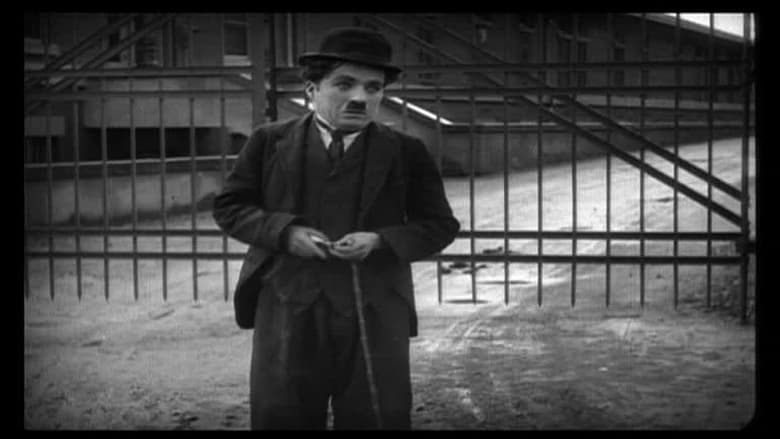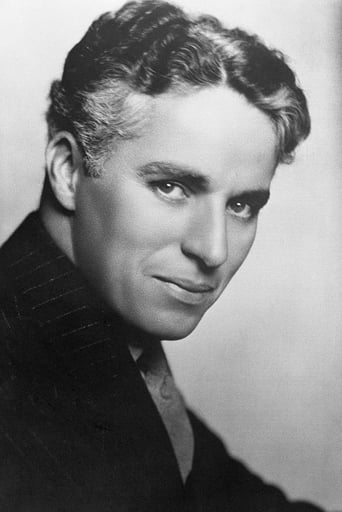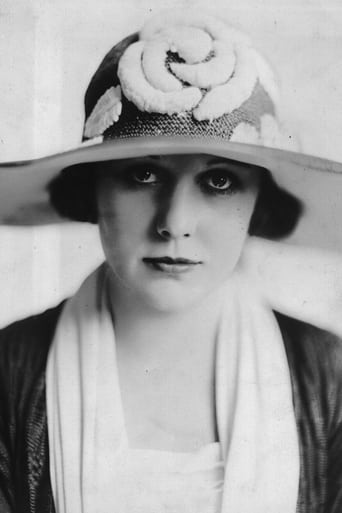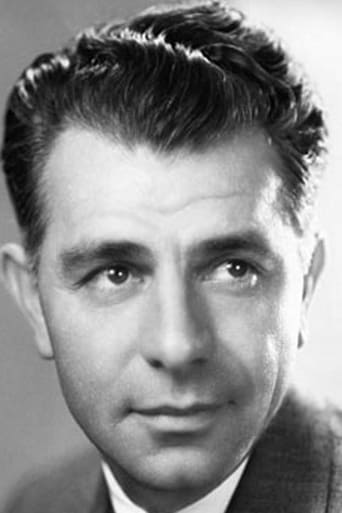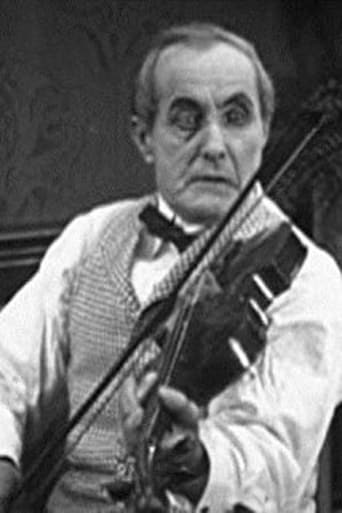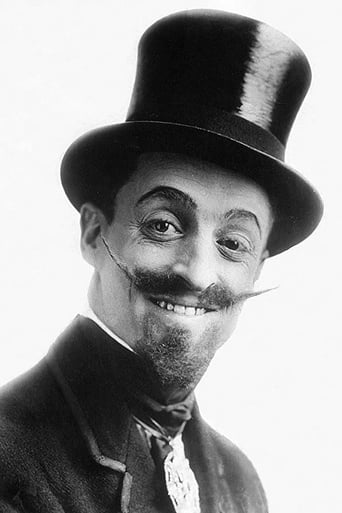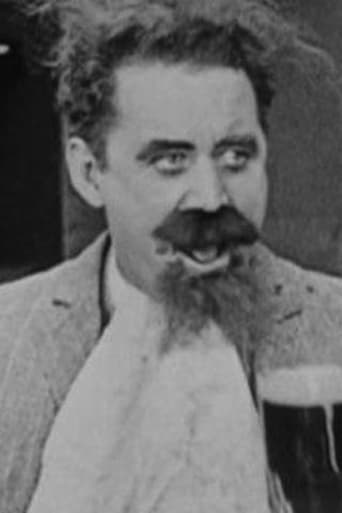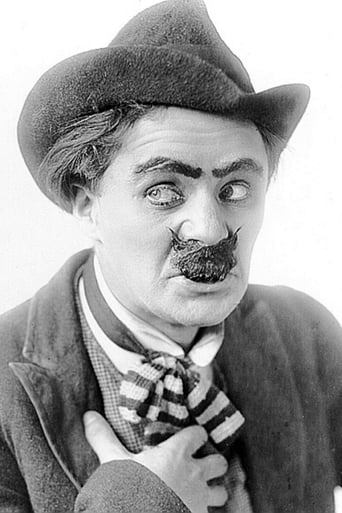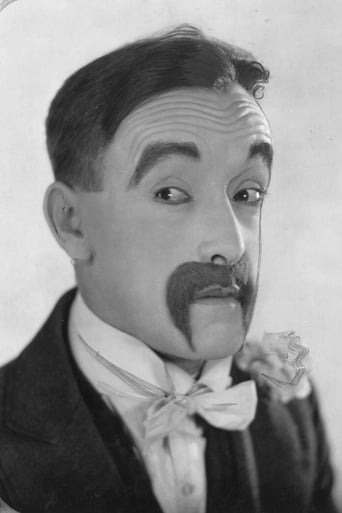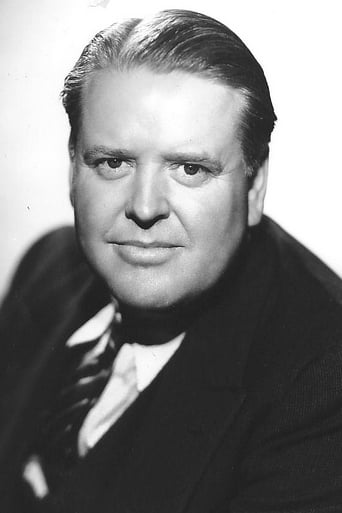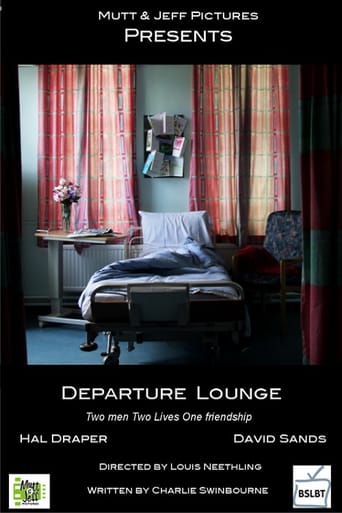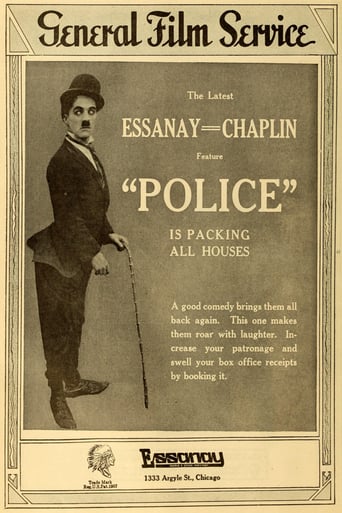
Charlie is released from prison and immediately swindled by a fake parson. A fellow ex-convict convinces Charlie to help burglarize a house.
Similar titles
Reviews
Just what I expected
Admirable film.
It's the kind of movie you'll want to see a second time with someone who hasn't seen it yet, to remember what it was like to watch it for the first time.
It is neither dumb nor smart enough to be fun, and spends way too much time with its boring human characters.
"Police" is a Charlie Chaplin film from 1916, so this one has its 100th anniversary this year. As a consequence, this is obviously a black-and-white silent film. Chaplin is writer, director and lead actor as so many other times and the cast includes his regular love interest Edna Purviance and some more actors who regularly appear in his works. The title already indicates that there is a certain crime story in here and police plays a role. Of course, Chaplin is not a police man, but he is the clumsy convict who goes against the police. He is not the bad guy though, just the one being in the wrong company, a role that suits Chaplin the best to display his innocent goofy humor. According to IMDb, there are quite a few different versions of this one that range between 17 and 38 minutes runtime. The one I watched was 24 minutes long. But it was too long already. There is a decent moment here and there, but like with many many other Chaplin films, it lacks subtitles considerably, to an extent when it's very difficult to understand the basic story at all. I do not recommend the watch. Thumbs down and I'm shocked this is among Chaplin's most famous.
Charlie Chaplin's penultimate film for Essanay is regarded as amongst the best of his output for the company. The film was actually released after his first film for the Mutual Film Corporation The Floorwalker, over five months after his previous Essanay film Burlesque on Carmen. Another interesting release related fact is that Police released over two years before his finally Essanay film Triple Trouble which was created in part by Chaplin regular Leo White by piecing together unused shots from other Chaplin films including this and the unfinished feature Life. Police stars Chaplin as a recently released convict trying to make it in a cruel and hostile world. The initial plot follows along the same lines as much of Chaplin's work. There were portions of Police that reminded me of Modern Times and the idea of the Tramp struggling to survive was used by Chaplin time and time again. It has been suggested that Chaplin borrowed the plot from Broncho Billy's His Regeneration for which he had an uncredited cameo and I agree that the character development at least is shared between the two.Having been swindled by a dodgy God botherer and having no money to pay for a bed for the night, the ex-con is held up at gunpoint by a man who turns out to be his ex-cell mate (Wesley Ruggles). The thief convinces the Tramp to assist him in robbing a nearby house and the two set about breaking in. Once inside they are confronted by the Daughter of the House (Edna Purviance) and chased by a number of Cops (Leo White, John Rand & Fred Goodwins). The Tramp manages to become the hero of the piece late on when he saves the Daughter of the House from a nasty attack. Police begins very promisingly with some wonderful comic business early on. A highlight came when Chaplin visited a fruit seller and tried numerous apples, taking a bit and putting them back until he found one to his liking. The first time he put an apple back I actually snorted with laughter. I also enjoyed the scene in which Chaplin meets his ex-cell mate and sneakily robs him while the man is searching Chaplin for money. It's subtle and clever. On a technical level the film is very good. I liked the scene in which Chaplin and Ruggles were shown only in shadow. This isn't something I remember seeing from Chaplin before and felt a bit German expressionist. I also thought that the use of filters was very accomplished. Filters are one of my least favourite aspects of early cinema but here Chaplin uses them well, leaving you in no doubt as to the time or setting of a scene. I felt that the second half didn't quite live up to the first and certainly wasn't as funny. That being said it was actually more reminiscent of later Chaplin, forsaking jokes in favour of plot and character development. Unfortunately the romantic element just doesn't live up to the likes of City Lights and the film's ending is a little flat. www.attheback.blogspot.com
One of my favorite things about watching these old short comedies that Chaplin was making before he really understood what his own message was is to watch the development not only of his style and on screen talent but also the development of his understanding of his audience. The tramp is the cinema's most famous everyman, and as far as I know this is his most criminal outing yet. The movie opens with him being released from jail and immediately two things happen: first he is swindled by someone claiming to be trying to get him on the right path, and second, he stumbles across a drunk with a nice gold watch hanging from his vest, begging to be stolen. He fumbles with it a bit, but never once indicates that the thought of stealing it ever enters his mind, even though he could easily get away with it.But before you go thinking that the tramp was just in the wrong place at the wrong time when he was convicted of whatever crime he was just released from prison for, he immediately becomes involved in a plot to rob a wealthy mansion in cahoots with none other than his old cell-mate. Apparently he didn't learn his lesson so well!Luckily, the tramp lives in a world where mansions are populated by his old pal Edna Purviance who, when bothered by the robbers intrusion, calls the police, who are so indifferent to the emergency call that they hang out at the police station chatting and sipping drinks before responding. In true Chaplin form, the tramp manages to win Edna's sympathy, and when the police finally arrive (in true Chief Wiggam form, as it were), he convinces them that he is her husband, and the tramp cheerfully enjoys a quick smoke with the three officers, tapping ashes into one of their hands on the way out, just as the one officer who knows what's going on arrives and throws himself against the door. The tramp has already slammed the door shut by this point, so he casually drop kicks his cigar as only Chaplin can and relishes in the fact that he has won. The unpleasantness that is sure to follow is unimportant, because soon Charlie falls in love and learns that there are more important things in life than robbing people. This is also one of the earliest films where Chaplin so clearly illustrates his almost Robin Hood-like contempt for the police's oppression of the people. Great stuff!
Charlie Chaplin's "Police" is rather uneven, as are so many of his Essanay features, although it does have a few good parts. In one respect, it's somewhat like his later movies, in that on a number of occasions some social commentary is obviously intended. But such ideas are not expressed nearly so well here as they would be in Chaplin's later, better-remembered films. Here, in fact, it is just these parts that usually slow things down. In this movie, at least, the slapstick generally works a little better than do the attempts to say something.In "Police", Chaplin plays a just-released convict, who gets involved with police officers, street preachers, and a variety of other characters as he tries to figure out what to do with himself. Some of his predicaments are good for some laughs, while others really do not come off. It's worth seeing, but there are many other Chaplin comedies, even from his early years, that are more satisfying. His efforts to combine social commentary with slapstick seemed to work much better later, when he not only had more experience, but also had complete control over his projects.
Top Streaming Movies











